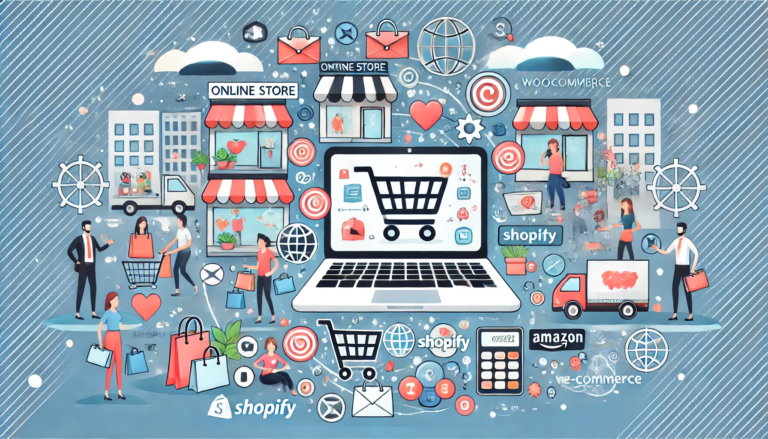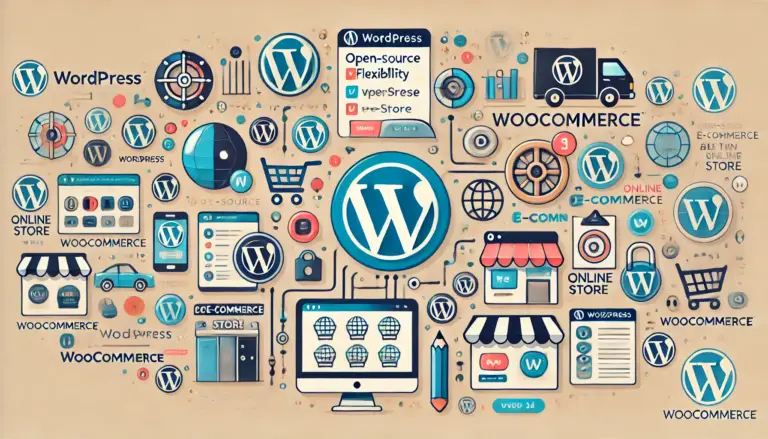1. WooCommerce
WooCommerce is a website and open-source flexible software solution built for WordPress-based websites. This flexible software solution is commonly used to create online e-commerce shops. With WooCommerce, anyone can turn their regular websites into fully functioning online stores, complete with all necessary e-commerce features. You can also integrate WooCommerce with an online marketplace, providing a seamless way to make money online without setup or monthly fees.
2. Wix
Wix is an all-in-one e-commerce platform that allows you to create a fully customizable website. Wix Studio caters to agencies and professional web designers, offering advanced design capabilities without the need for coding. Currently, Wix offers over 900 website templates, powerful built-in business solutions, and more. One of the best things about Wix is that it’s free to get started! You can use their platform to build a business, and if you’re looking to extend your success, take advantage of Wix’s booking system to enhance your services and grow your brand.
3. Shopify
Shopify is a hosted, template-based platform that provides a simple and efficient way to set up and manage online stores. It allows you to sell both online and in person. Entrepreneurs, retailers, and global brands use Shopify to process sales, run stores, and grow their businesses. Whether you’re starting your first e-commerce website or managing a world-leading retail business, Shopify is one of the best platforms available for creating an online shopping experience.
With Shopify, you can integrate social networking, post products, manage shopping carts, process payments, and even handle order processing—all from one user-friendly interface. The platform is designed to help small businesses build an online store and manage sales through a streamlined dashboard. Shopify works by centralizing your product data, customers, and operational tasks into one system that connects to all your sales channels. Its intuitive design means even users without advanced tech skills can easily add products, create discounts, and process orders.
If you’re looking to build your success in e-commerce, Shopify is an ideal platform to get your brand in front of a global audience. With Shopify’s tools, you can confidently grow your store and reduce the stress of managing an online business.
4. BigCommerce
BigCommerce is another highly customizable and user-friendly e-commerce platform. Offering features like multi-storefronts and Google Shopping integration, it’s ideal for businesses of all sizes. BigCommerce customers can build and design beautiful online stores, operate multiple brands, and sell globally. The platform is especially suited for businesses with high sales revenues or those looking to scale internationally. If you’re seeking a platform to manage an extensive product catalog and create engaging, aesthetically pleasing sites, BigCommerce is an excellent choice.
By using BigCommerce, you’ll have the flexibility to create sites that impress visitors from the moment they arrive. The platform’s powerful features make it perfect for businesses looking to elevate their success online. Want to enhance your brand and engage more shoppers? BigCommerce makes it easy to design intuitive sites that can expand your reach globally.
5. Adobe Commerce
Adobe Commerce is an enterprise-level e-commerce solution that delivers superior shopping experiences for consumers and B2B buyers alike. With features like live search, product recommendations, and catalog management, Adobe Commerce is built to support businesses that handle large volumes of products and transactions.
What sets Adobe Commerce apart is its seamless data sharing across marketing technologies, which helps enhance customer engagement and loyalty. The platform’s ability to create personalized shopping experiences makes it one of the most robust solutions for scaling your business. It offers flexible customization options, headless architecture, and seamless third-party integrations. Adobe Commerce allows brands to craft unique shopping experiences that engage customers from the first click to the final purchase.
For those who want to create immersive, dynamic e-commerce sites, Adobe Commerce is a powerful tool to consider.
6. Amazon Hub Counter
When we think about e-commerce dominance, no company comes to mind more than Amazon. Founded in 1994 by Jeff Bezos, Amazon was one of the first companies to sell goods online and has since become the world’s largest retailer, boasting over $480 billion in sales. For e-commerce businesses, Amazon offers numerous advantages, and one such feature is the Amazon Hub Counter.
The Amazon Hub Counter enhances customer experience by optimizing delivery and return processes, reducing the chances of lost or damaged packages. Customers no longer need to wait for couriers at home or use lockers; they simply select the Hub Counter as their delivery option, then go to the designated location to pick up their package. This level of convenience leads to higher customer satisfaction and loyalty.
For sellers, Amazon Hub Counter increases store traffic, as customers frequently visiting to pick up their orders often turn into loyal patrons. Many businesses worldwide are already benefiting from this system, providing valuable services and boosting revenue. Some sellers are making over $100,000 per month by utilizing Amazon’s delivery services. By incorporating the Hub Counter into your business, you can introduce your brand to new customers and significantly improve your e-commerce success.





